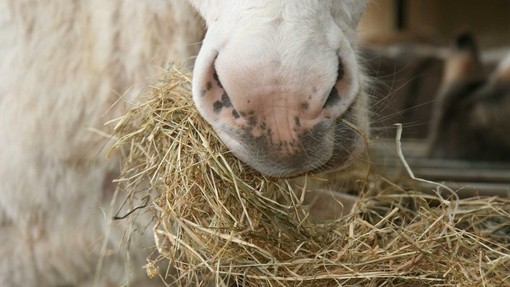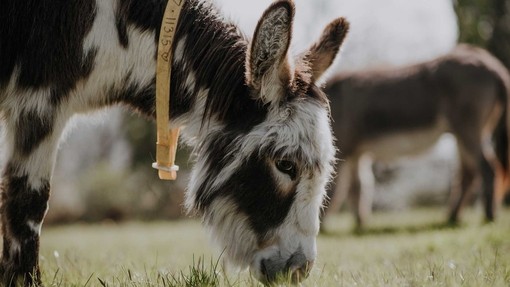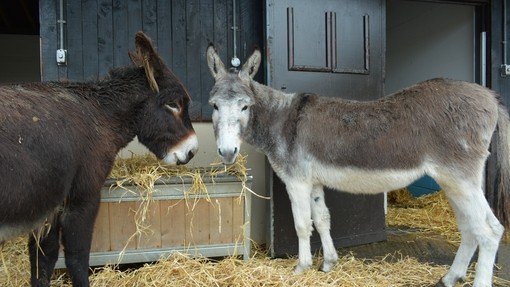Things you should do
- Do assess the donkey’s ability to chew long fibres (straw, hay or haylage).
- Do take into account the donkey’s consumption of bedding (straw), if the donkey tries to eat bedding that he or she can’t manage we would advise changing to a non-edible option such as wood shavings.
- Provide a good quality, soft hay if the donkey’s teeth allow it.
- Donkeys with very poor teeth may need all long fibres replacing – use short chopped chaff products designed as long fibre replacers.
- Feed according to body condition, donkeys with poor teeth are often still overweight!
- Feed ‘little and often’ to ensure donkeys are trickle feeding as they would in the wild by providing 24 hour access to appropriate fibre.
- Assess grazing management, very short or fibrous grazing may be difficult to eat, restricted areas of medium length grass may be more appropriate in some cases.
- If the donkey has had extensive dental work consider using soaked high fibre nuts in the 3-7 days afterwards to encourage sustained energy intake.
Dropping partially chewed food (quidding) is a sure sign of poor dentition.
Things you should avoid
- Avoid all cereal grain based feeds, donkeys can be maintained and encouraged to gain weight on fibre based products without the need for inappropriate cereal feeds.
- Don’t feed dry feeds, always make sure they are damp, donkeys with dental problems will often choke on feeds that are dry as they are swallowed whole rather than chewed.
- Don’t provide very fibrous alfalfa products as long fibre replacers as they are too difficult to chew.
- Don’t feed unmanageable treats eg chopped carrots/apples, these are better grated or puréed.
Possible diets
Long fibre forages may need supplementing or completely replacing depending upon the severity of the problem.
Donkeys able to manage some hay but that are not maintaining weight can be provided with supplementary feeds, we have successfully used the following:
- Soaked high fibre nuts (Spillers High Fibre Nuts and Saracens Donkey Diet).
- Speedi Beet (made by British Horse Feeds) – excellent as a top dressing for high fibre nuts to increase palatability.
- Fibre Beet (made by British Horse Feeds) – high calorie alfalfa-based product, excellent as a bucket feed for very underweight animals.
- Mollichaff Donkey, Mollichaff Hoofkind or Spillers Happy Hoof – chaff products that can be used as a sole bucket feed or to mix with above.
- TopChop Zero - very low calorie chaff useful for helping overweight donkeys lose weight, made from chopped straw so may be more fibrous than other short chopped chaffs therefore may not suitable for donkeys with severe dental disease. Mix with forage balancer (below) for a complete feed.
- Feed Balancer – Top Spec Donkey Forage Balancer (for ideal/overweight donkeys) or Top Spec Comprehensive Balancer (for underweight donkeys) may be good additions to the diet for elderly donkeys with poor teeth that are on a forage based diet. The balancer may need soaking to make it easier to eat.
For donkeys unable to manage any long fibre – use short chopped chaff products designed as long fibre replacers. We have successfully used the following:
- Mollichaff Hoofkind or Spillers Happy Hoof – feed to underweight / geriatric animals, provide 2–3 kg per day for the average sized donkey to satisfy appetite.
- Mollichaff Donkey – feed to under/ideal weight donkeys, if feeding for maintenance monitor for weight gain and switch to or mix with a lower energy chop if required, provide 2–3 kg per day for the average sized donkey to satisfy appetite.
- TopChop Zero - great for overweight donkeys as very low in energy. Feed adlib and mix with a balancer to make a complete feed.
Short chopped chaff products can also be fed in conjunction with the bucket feeds outlined above.




